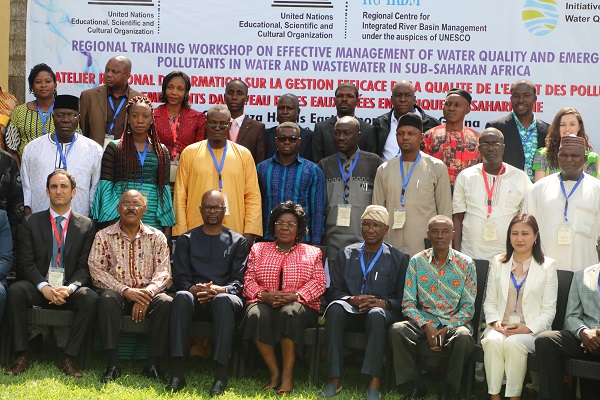
Lack of political will cause of poor water quality– UNESCO regional boss
The Regional Director of the United Nations Educational, Scientific and Cultural Organisation (UNESCO), Mr Yoa Ydo has attributed the inability of African states to make significant progress in improving water quality and availability to the lack of political will.
He also named low capacity building and the lack of awareness on linkages between water equality and health as some of the causes of poor water quality in the continent.
He said this at a three-day regional workshop organized by UNESCO to build synergies on the effective management of water quality across the African continent in Accra.
“Tackling water quality issues means solving poverty, promoting good health and advancing national development”, he said.
The workshop which brought together participants from over 40 African countries was on the theme; “Effective management of water quality and emerging pollutants in water and wastewater in Sub-Saharan Africa.”
The workshop seeks to advance plans at achieving goal six of the Sustainable Development Goals (SDGs), which seeks to ensure availability and sustainable management of water and sanitation for all.
In her opening address, the Minister of Water and Sanitation, Mrs Cecelia Abena Dapaah said it was high time attention was given to the treatment of waste water to supplement the growing water deficiency on the sub-region.
She added that various scientific researches show that waste water is a valuable resource which when managed and treated properly can be re-used.
“Treating waste water before discharging it also prevents the introduction of pollutants in the environment,” and called on governments for dedication of resources towards research, and the necessary infrastructure to improve the management of water resources including waste water while building efforts “towards knowledge dissemination and sharing of best practices and solutions.”
Mrs Dapaah further stated that water resources and wetlands plays important role in boosting the regional economy but they are one of the most threatened ecosystems.
She added that, “These Rivers have been terribly polluted because of illegal or unregulated mining activities, indiscriminate dumping of waste, open defecation and the use of agro-chemicals by famers in the water bodies’.
This, according to the Minister tend to decline water quality and increase uncertainty of water availability.
‘‘With each passing day, we are faced with the challenge of declining water quality and increasing uncertainty of water availability. This situation is compounded by the emergence of new pollutants from personal care products, pharmaceuticals, pesticides, micro plastics, and industrial and household chemicals“.
She however said steps were being taken by government to increase monitoring and enforcement of laws to deal with issues that threaten the survival of water bodies.
“The development of guidelines for managing drinking water quality, which focuses on the management of risk to water pollution or contamination along the supply chain, and the campaign against open defecation and indiscriminate dumping of refuse are other efforts by government to address the challenge,” she stated.
The Acting Director of Water Research Institute of Ghana and the West African Representative at the Regional Centre for Integrated River Basin Management (RC-IRBM), Dr Kankam Yeboah, commended UNESCO for the initiating talks on the issue to fight against such threatening factors to secure the continent’s future.
On her part, the Secretary-General of the Ghana National Commission for UNESCO, Mrs Ama Serwaa Nerquaye Tetteh, called for collaboration between experts in the natural and social sciences to have a holistic approach in addressing water pollution.
